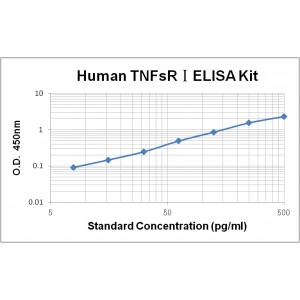More info
Assay Range | 7.8 - 500 pg/mL |
Sensitivity | 1.0 pg/mL |
Size | 96T |
Storage | Store at 2 - 8ºC. Keep reconstituted standard and detection Ab at -20 ºC |
Assay Principle | Sandwich ELISA |
Sample Volume | 100 µL final volume, dilution factor varies on samples |
Detection Method | Chromogenic |
Kit Components
1. Recombinant Human TNFsR I standard: 2 vials
2. One 96-well plate coated with Human TNFsR I Ab
3. Sample diluent buffer: 12 mL - 1
4. Detection antibody: 130 µL, dilution 1:100
5. Streptavidin-HRP: 130 µL, dilution 1:100
6. Antibody diluent buffer: 12 mL x1
7. Streptavidin-HRP diluent buffer: 12 mL x1
8. TMB developing agent: 10 mL x1
9. Stop solution: 10 mL x1
10. Washing solution (20x): 25 mL x1
Background
Tumor necrosis factors (TNFs) are the primary modulators of the inflammatory and immune reactions in mammalians in response to injury or infection. Two forms of TNF, named TNF-α (or cachectin) and TNF-β (or lymphotoxin), have been identified and are capable of competing for binding to the same receptors. The actions of TNFs are transduced by binding to tumor necrosis factor receptors which are composed of TNF RII (Type A, Type a, or utr antigen) and TNF RI (Type B, Type b, or htr antigen). Both TNFRI and TNFRII bind TNF-α or TNF-β with high affinity, and they exhibit similar extracellular domains but distinct intracellular domains, suggesting they employ different signal transduction pathways and function differently.
Two types of soluble TNF binding proteins, representing truncated forms of the two types of TNF receptors, designated sTNF RI (or TNF BPI) and sTNF RII (or TNF BPII), respectively, have been identified in human serum and urine. sTNF RI and sTNF RII can bind to TNF in vitro and inhibit its biological activity by competing with cell surface TNF receptors (TNF RI and TNF RII) for TNF binding. Elevated levels of soluble TNF receptors have been found in the amniotic fluid and urine of pregnant women, in serum or plasma in association with pathological conditions such asendotoxinemia, meningiococcemia, and HIV infection.


